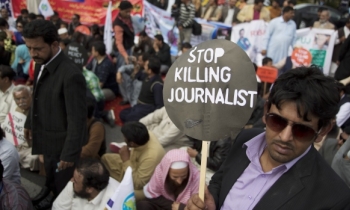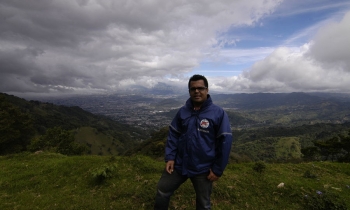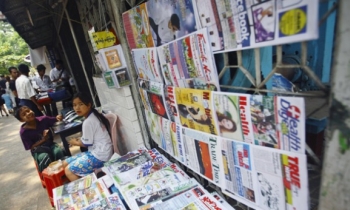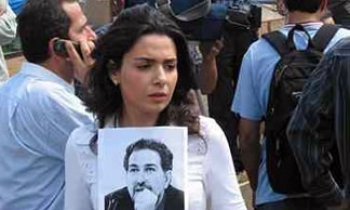Freedom of speech in Bulgaria took one of its most serious hits last week after on April 6, a bomb detonated in front of the flat of Vassil Ivanov, an investigative journalist from Nova Television, one of the three national broadcast stations.
The bomb was planted in front of the entrance to Ivanov’s flat in a seven-storey apartment block in Sofia’s Banishora neighbourhood. Miraculously, no one was seriously harmed. Ivanov himself was not in the apartment at the time of the explosion. His only relatives in the flat were his sister and sick mother, who suffered minor injuries and shock. The repercussion from the blast was so powerful that the entire building suffered structural damage. The detonation occurred at about 3am.
Interior Ministry experts said the size of the explosion equalled roughly 0.4kg of TNT. About 200 sq m of the block’s windows were broken by the blast. The explosion swept away the front doors of the four apartments on the seventh floor; the two lifts were also destroyed. Cars parked in front of the entrance to the building were damaged.
Blasts and public murders, unfortunately, are not something new for Bulgarians, but this is the first case of an explosive of this size being aimed at a leading journalist such as Ivanov. However, the attack on Ivanov’s life was not unexpected, as Ivanov said in numerous interviews following the attack.
Ivanov started his career as a Bulgarian National Television (BNT) reporter and later moved to Nova TV. Over the past couple of years, Ivanov has made a name for himself with a series of reports revealing corrupt state officials and other wrongdoing. Among Ivanov’s scoops was a 2005 report showing a large number of MPs drinking coffee in the cafes around the Bulgarian Parliament building, thus delaying voting on important bills because of a lack of a quorum.
In 2004, he managed to enter the Ministry of Foreign Affairs building with a grenade launcher in his backpack, exposing a lack of security.
Two of Ivanov’s recent reports have again attracted much attention. As a result of the first, legal proceedings were launched against Georgi Zlatev, a notary who illegally sold Ivanov the official cars of President Georgi Purvanov and of then-prosecutor-general Nikola Filchev. In the second report, Ivanov broadcast footage of homosexual orgies in Sofia Central Prison, which led the dismissal of prison head Dimitar Raychev and three prison guards, who were accused of lack of control. Legal action has been initiated against the three guards; Raychev was dismissed.
Several months ago, Ivanov received a phone threat. This happened immediately after Nova TV broadcast the report on Zlatev’s malfeasances. After the airing of the material, Ivanov was "warned" to be careful what he chose to report, or "things would happen to him", Ivanov said after the explosion. Because of the threats, Ivanov was guarded day and night and police were on watch in front of his home. Later on, the guards were called off. After the April 6 blast, Ivanov’s security is again in their hands.
The reports about Zlatev and Sofia Central Prison provided police with some leads, Ivanov told reporters after the blast. Ivanov made the comment after meeting Interior Minister Roumen Petkov in the early hours of April 6. Petkov described the bomb attack as "an extreme act of brutality against free speech and the Bulgarian state".
Later the same day, Petkov was invited by Parliament to report on the incident. He described the explosion as an act of flagrant aggression against the media, reporters and those who "expose unpleasant facts about certain people and institutions". Petkov provided details about the explosion and spoke about the measures undertaken by the police.
"I want to state that all measures have been taken and all available resources have been put to work," he said.
However, MPs from the right-wing opposition were displeased that Petkov did not say anything about the investigation itself. Speaking to reporters in the corridors of Parliament, Petkov said that the various leads followed by the police in connection with this latest incident and others before it, had been not disclosed in the interest of the investigation. He said he had informed Prosecutor-General Boris Velchev about the blast earlier in the morning.
Velchev also made a statement about the incident later the same day.
"What was done in Sofia this morning is an attempt to scare the public and inspire the idea that problems may be resolved with violence, explosions, killings and terror," Velchev told reporters before a meeting of the parliamentary committee on counteracting corruption.
Prime Minister Sergei Stanishev described the explosion as outrageous.
"This is a direct encroachment on the freedom of speech and requires the taking of very serious measures by the state. It is clear there will be resistance on the part of those who do not want to live in an orderly state with effective laws and a strong democratic system," Stanishev said, speaking to reporters while on a visit in Bucharest.
Solid support for Ivanov came from his colleagues all over the country and the public in general. It had been quite a long time since freedom of speech and Bulgarian journalism had received such public support and sympathy. Hours after the explosion, Ivanov appeared on the other two rival national TV stations, BNT and bTV, as the leading news.
After the news of the explosion spread in the media, declaration after declaration in support of Ivanov started to appear. Reporters from Bulgarian National Radio’s Horizon programme issued a statement voicing their anger and indignation at the attempt "to threaten a fellow journalist".
The Union of Bulgarian National Electronic Media and the Union of Publishers in Bulgaria condemned the attempt on the life of Ivanov. The Council for Electronic Media, the Union of Journalists in Bulgaria, the Podkrepa Labour Confederation, the Association of Investigative Journalists and 7 Days TV also decried the incident.
Bulgarian politicians, legislators and business people must build a wall against the acts of the organised and the economic crimes, said the Union of Journalists in Bulgaria.
Bulgarian news agency BTA also joined the declarations of journalists, institutions, organisations and political forces condemning the attempt on Ivanov’s life.
"BTA reporters express indignation at such attempts to deal with investigative journalism," the statement read.
Journalists from local media in Gabrovo, Pleven, Stara Zagora, Varna and other Bulgarian cities also declared their support for Ivanov.
On April 7, the public responded with a major protest under the name Citizens Against Mafia. The protest was held in Sofia in front of the Cabinet office. More than 200 journalists from Bulgarian media gathered, despite the rain, to protest against such encroachment on freedom of speech. Colleagues of Ivanov urged him to have courage and continue investigations into the darkest side of crimes and corruption in Bulgaria.
As for Ivanov, he declared his determination to continue working as investigative journalist. In an interview with a Bulgarian-language newspaper, Ivanov called the explosion a "terrorist act".
"The bomb at my doorstep was a threat to the entire community. I have also discussed this issue with Interior Minister Roumen Petkov. As far as I understand, the police do want to bust these scumbags who are prepared to kill 20 people because someone showed them on TV," he said.









